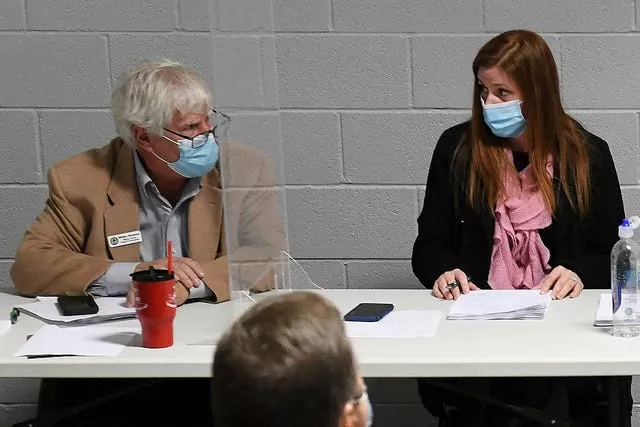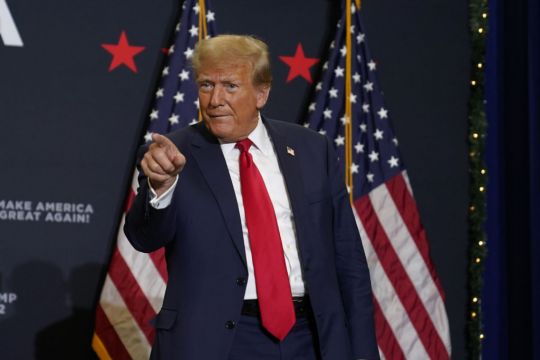Donald Trump pressured two election officials not to certify 2020 vote totals in a key Michigan county, according to a recording of a post-election phone call disclosed in a report by The Detroit News.
The former US president’s 2024 campaign neither confirmed nor denied the recording’s legitimacy, insisting in a statement that all of Mr Trump’s actions after his defeat to Democrat Joe Biden were taken to uphold his oath of office and ensure fair elections.
Mr Trump has consistently repeated falsehoods about the 2020 election as he runs for the White House again. No evidence has emerged in a litany of federal, state and outside investigations of voter fraud that could have changed the outcome of the election.
The November 17th, 2020, telephone call included then-president Mr Trump, Republican National Committee chairwoman Ronna McDaniel and Wayne County elections authorities Monica Palmer and William Hartmann, both of them Republicans, The Detroit News reported.
Mr Trump told the two canvassers that they would look “terrible” if they certified results after having initially opposed certification, the newspaper said.

The two ultimately issued signed affidavits asserting their opposition to certifying Wayne County’s results.
The newspaper said the recordings were made by a person who was present for the call with Ms Palmer and Mr Hartmann.
The report comes as Mr Trump seeks the 2024 Republican nomination while grappling with multiple criminal indictments, including a federal case and a Georgia case tied to his efforts to overturn Mr Biden’s victory.
As he campaigns for a return to the White House, Mr Trump continues to repeat the lies that the 2020 election was stolen, despite multiple recounts and court cases confirming his defeat.
Mr Biden won Michigan, with Wayne County, which includes Detroit, providing a trove of Democratic votes.
“We’ve got to fight for our country,” Mr Trump said on the recordings, according to The Detroit News. “We can’t let these people take our country away from us.”
Ms McDaniel, a Michigan native, reportedly said during the call: “If you can go home tonight, do not sign it,” adding: “We will get you attorneys.”

Mr Trump is said to have reinforced the point, assuring the local officials: “We’ll take care of that.”
Steven Cheung, a spokesperson for Mr Trump, said in a statement that Mr Trump’s actions were “were taken in furtherance of his duty as president of the United States to faithfully take care of the laws and ensure election integrity.”
“President Trump and the American people have the constitutional right to free and fair elections,” Mr Cheung said.
Mr Trump sat for a lengthy interview on conservative radio on Friday but host Hugh Hewitt did not ask about the Michigan report. Mr Trump instead spent the interview clarifying his remarks earlier this month that he had “day one” plans akin to being a “dictator”.
Asked directly on Friday whether he would rule as an authoritarian, Mr Trump responded: “Not at all. No, I’m gonna rule as somebody that’s very popular with the people.”
Mr Trump also defended his previous comments that people entering the US illegally are “poisoning the blood of our country”. He insisted he was “not talking about a specific group” and said he had not been aware that he was using rhetoric that Adolf Hitler used as German dictator.
“I know nothing about Hitler. I’m not a student of Hitler. I never read his works,” Mr Trump told Mr Hewitt. Despite those denials, Mr Trump insisted confidently that Hitler “didn’t say it the way I said it.”
Mr Hewitt did ask whether Mr Trump, if he were elected to another term, would willingly cede power when it concluded and he was constitutionally barred from holding office any longer.
“Of course. And I did that this time,” he said, before reverting to his false claims of a rigged 2020 election.

The Republican National Committee did not immediately respond on Friday to The Detroit News’s report about the 2020 phone call featuring Ms McDaniel.
The new disclosure of the recording appears to add details to communications with local officials referenced in the January 6th committee’s final report on Mr Trump’s actions after the 2020 election and leading up to the January 6th, 2021, attack on the US Capitol by Mr Trump’s supporters on the day that Congress convened to ratify the Electoral College results.
That congressional report states that Mr Trump and Ms McDaniel called Ms Palmer and Mr Hartmann “about 20 minutes after” the two officials had changed their initial votes and agreed to certify the results.
“The Select Committee doesn’t know what President Trump privately said on that phone call,” the report states.
The committee states that Mr Hartmann, at the time of the congressional inquiry, said that he was not pressured in a conversation he described as involving “general comments about different states”.
But the January 6th committee emphasised Ms Palmer and Mr Hartmann’s decision, made after Mr Trump’s call, to issue the signed affidavits reasserting their original opposition to certification.
The Michigan call would have occurred about six weeks before another call Mr Trump made to Georgia secretary of state Brad Raffensperger. That conversation is among the key points in Mr Trump’s indictment in Fulton County that accuses the former president of a racketeering scheme to overturn Mr Biden’s narrow victory in Georgia.
“I just want to find 11,780 votes, which is one more than we have,” Mr Trump told Mr Raffensperger in that call. “Because we won the state.”
Georgia counted its votes three times before certifying Mr Biden’s win by an 11,779-vote margin.







